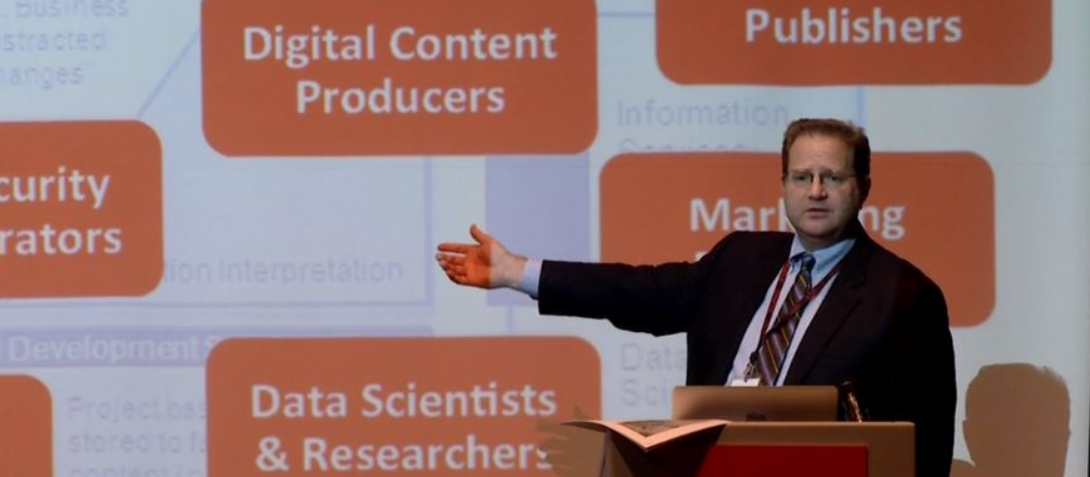Social Media prognostications are always fun to consider, and try (if there’s a Beta version) – but today’s Potomac TechWire "Social Media Outlook 2011" breakfast was all business, with true ROI. As a Rohit Bhargava put it, “what’s the ROI of attending this meeting?” It’s the “social” ROI, vs. the “media” ROI – and it’s actually not that hard to categorize and track.
The general consensus by presenters and the panel boiled down to a few key topics for businesses to consider, learn more about, and take action upon – here’s a few important ones.
(1) It’s true that there’s a tremendous actual and potential benefit for businesses in utilizing the “2 ½” major social media platforms, i.e. Facebook, Twitter and LinkedIn. But it’s equally true, that there’s likely equivalent benefit available in leveraging other social media channels and services that are similar to or actually integrated with “the mothership”. For example, using Quora for some knowledge research by audience segment, and the associated expansion of knowledge presence (on the Web) that provoking thoughtful Q & A might bring. Signing in to Quora with one’s Twitter or Facebook ID, automatically kicks off some relationship networking and associations that significant increase exposure on Quora.
(2) Organizations really need to better understand and shape their online dialogue according to purpose, audience, originating department (i.e. area of the company) and with appropriate leverage of “social currency”. For example, B2B target customers probably wouldn’t be interested in or motivated to “like” a product or service article posted on the corporate blog by the interactive marketing team, but they probably would be interested in “following” a hashtag-categorized commentary on Twitter that’s associated with a product implementation case study, moderated by a Tweeter from the engineering department.
(3) While it’s extremely important to have some appropriately-designed and resourced presence on the majors (i.e. FB/TW/LI), it’s equally important to have a firm understanding and management of the “hub” of your corporate digital media activities. At the end of the day, companies and services like Twitter and Google aren’t yours; they own the data, and they may change or fail for reasons you don’t control. As well, without a “hub and spoke” mentality to distributing and monitoring digital media and conversation, economies of scale are lost across the whole lifecyle – from content authoring, to optimization, to application of policies and rules, to tagging, to distributing, to analyzing…
It’s a wise strategy to consider building a corporate digital presence “hub” with digital engagement technologies that you own and maintain (like a very dynamic and integrated Blog), from which your categorized and optimized digital conversations and assets are distributed, syndicated, and supported (from a feedback, analytics and quality perspective). In other words, your Facebook page shouldn’t be your primary corporate hub and branding vehicle.
By far the best quote came from Addie Connor of the Washington Post’s “SocialCode” Facebook agency – (in response to a CFO’s concern about whether “buying” Fans was fiscally responsible) “with the right ROI, you’ll buy fans all day long”.
Thanks to the Fairfax County Economic Development Authority, and BIA Kelsey for sponsoring this event.
The general consensus by presenters and the panel boiled down to a few key topics for businesses to consider, learn more about, and take action upon – here’s a few important ones.
(1) It’s true that there’s a tremendous actual and potential benefit for businesses in utilizing the “2 ½” major social media platforms, i.e. Facebook, Twitter and LinkedIn. But it’s equally true, that there’s likely equivalent benefit available in leveraging other social media channels and services that are similar to or actually integrated with “the mothership”. For example, using Quora for some knowledge research by audience segment, and the associated expansion of knowledge presence (on the Web) that provoking thoughtful Q & A might bring. Signing in to Quora with one’s Twitter or Facebook ID, automatically kicks off some relationship networking and associations that significant increase exposure on Quora.
(2) Organizations really need to better understand and shape their online dialogue according to purpose, audience, originating department (i.e. area of the company) and with appropriate leverage of “social currency”. For example, B2B target customers probably wouldn’t be interested in or motivated to “like” a product or service article posted on the corporate blog by the interactive marketing team, but they probably would be interested in “following” a hashtag-categorized commentary on Twitter that’s associated with a product implementation case study, moderated by a Tweeter from the engineering department.
(3) While it’s extremely important to have some appropriately-designed and resourced presence on the majors (i.e. FB/TW/LI), it’s equally important to have a firm understanding and management of the “hub” of your corporate digital media activities. At the end of the day, companies and services like Twitter and Google aren’t yours; they own the data, and they may change or fail for reasons you don’t control. As well, without a “hub and spoke” mentality to distributing and monitoring digital media and conversation, economies of scale are lost across the whole lifecyle – from content authoring, to optimization, to application of policies and rules, to tagging, to distributing, to analyzing…
It’s a wise strategy to consider building a corporate digital presence “hub” with digital engagement technologies that you own and maintain (like a very dynamic and integrated Blog), from which your categorized and optimized digital conversations and assets are distributed, syndicated, and supported (from a feedback, analytics and quality perspective). In other words, your Facebook page shouldn’t be your primary corporate hub and branding vehicle.
By far the best quote came from Addie Connor of the Washington Post’s “SocialCode” Facebook agency – (in response to a CFO’s concern about whether “buying” Fans was fiscally responsible) “with the right ROI, you’ll buy fans all day long”.
Thanks to the Fairfax County Economic Development Authority, and BIA Kelsey for sponsoring this event.

Comments